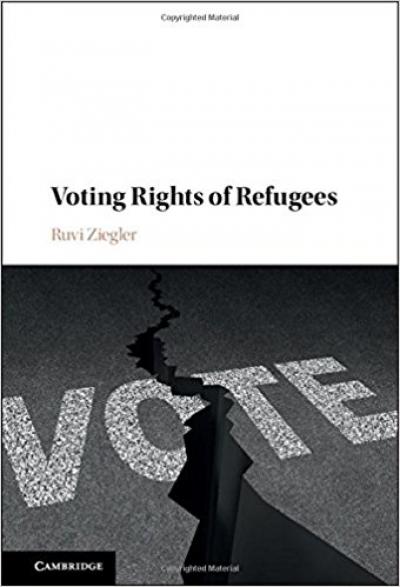Guest post by Ashwini Vasanthakumar, Lecturer in Politics, Philosophy & Law, Dickson Poon School of Law, King’s College London. Ashwini is on Twitter @ashwinivasantha.
Review of Voting Rights of Refugees by Ruvi Ziegler (Cambridge University Press, 2017).

Ziegler’s argument carves out for itself a unique space in the philosophical and legal discourse surrounding refugees and asylum. On the one hand, his argument may not seem sufficiently radical. After all, many scholars are arguing for open borders. They note, sometimes with celebration, the demise of the sovereign state and the emergence of sub-national, transnational, and supra-national communities and identities. They dwell on the plethora of calamities, ranging from severe poverty to domestic abuse to environmental degradation to armed conflict, that compel people to migrate. And they illustrate the cruelty of the borders, and the increasingly draconian methods of enforcing them, that confront these desperate millions.
On the other hand, Ziegler’s arguments might seem excessively utopian. Even with the advent of the global human rights project and the push towards global governance, power is firmly vested in states. Few contexts illustrate this as vividly as migration. The 1951 Convention and the system of refugee protection it engendered are, to put it mildly, in jeopardy. States violate the Convention with effective impunity; the basic rights of refugees and other migrants are far from secure; and the demonization of refugees is now a standard feature of political discourse in much of the West. Advocates aim for minimal compliance with the Convention while policymakers, conceding to political and economic exigencies, push for lesser alternatives to asylum.
Nudging gently the constraints of the 1951 Convention might not seem to reflect the sweeping transformations that some philosophers call for, nor to respond to the challenges of realising even the barest protection promised by the Convention. In an era of ‘Muslim bans’ and offshore detention centres, critics might find Ziegler’s argument a bit beside the point. But this would be a mistake. For in its own, careful way, Voting Rights of Refugees advances a number of provocative claims. It reaffirms the particularity of refugee status, and recovers the purpose of the 1951 Convention: to remedy the particular dilemma of those who cannot rely on the political protection of their state in a world where only states, ultimately, can provide such protection. If Convention refugees have a claim to participate in elections in their countries of residence, this claim follows from their particular dilemma rather than from generally applicable principles of democracy or justice. Ziegler is careful to restrict his argument for enfranchisement to Convention refugees, and not to other vulnerable individuals (even though his arguments for voting can apply far more broadly). This pushes against another trend in the literature: expanding the moral and legal definition of a refugee to encompass those fleeing environmental disasters, poverty, and public disorder. No doubt these individuals have claims of justice that impose significant duties on the international community; by elaborating on the meaning and purpose of the 1951 Convention, however, Ziegler suggests the Convention is not an instrument to secure global justice. But, by showing that there are further entitlements latent within the Convention, Ziegler illustrates the potential for greater protection available within the existing instrument—against those who believe the Convention is inadequate or static.
Many of these implications are implicit. Ziegler confines himself to detailed doctrinal analysis and provides an excellent and informative discussion of the Convention and the rights of refugees. This is the central contribution of Voting Rights of Refugees, of interest to legal scholars focused on the 1951 Convention and political philosophers exploring voting rights outside the citizen-state context (a context of increasing import). To be sure, Ziegler does not address himself directly to broader legal and philosophical scholarship on refugee protection or to policy debates about the utility of the Convention and the existing scheme of refugee protection. By carefully excavating the logic of protection at the heart of the refugee regime, however, Ziegler’s analysis certainly illuminates these broader issues.
Any comments about this post? Get in touch with us! Send us an email, or post a comment here or on Facebook. You can also tweet us.
__________
How to cite this blog post (Harvard style)
Vasanthakumar, A. (2017) Book Review: Voting Rights of Refugees. Available at: https://www.law.ox.ac.uk/research-subject-groups/centre-criminology/centreborder-criminologies/blog/2017/07/book-review (Accessed [date])
Share:








